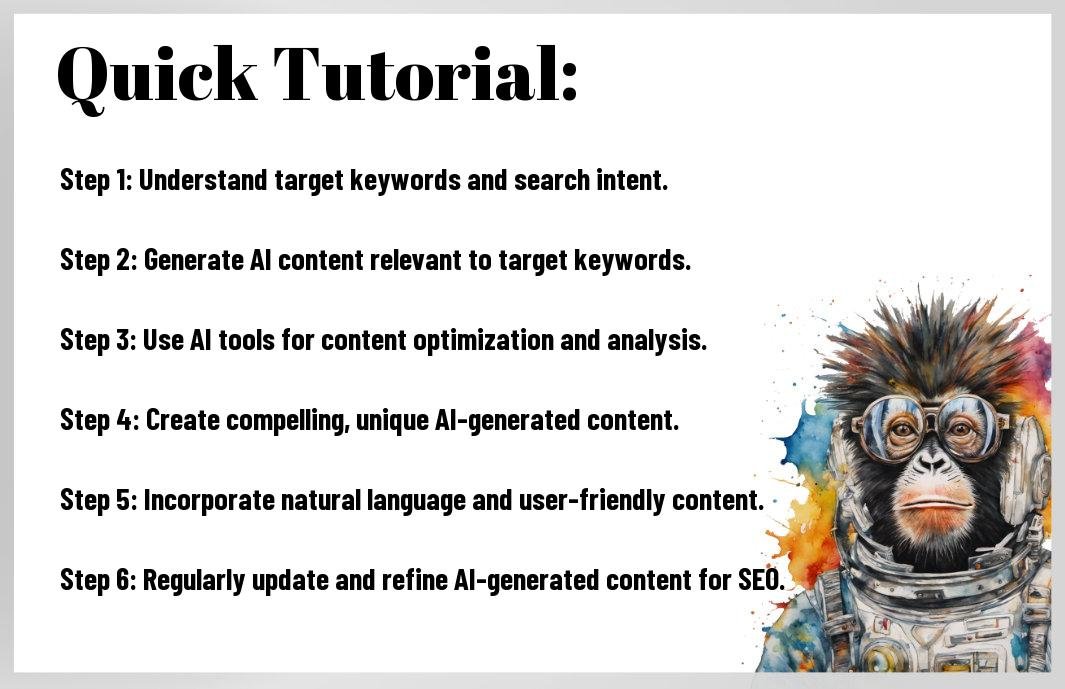Efficiently leveraging artificial intelligence for content creation can significantly enhance a website’s search engine optimization (SEO) performance. By understanding how AI-generated content can be tailored to meet the demands of search engine algorithms, businesses can unlock the potential for higher rankings and increased online visibility. In this top 10 listicle, we’ll explore the various ways AI-generated content can be fine-tuned to improve SEO rankings, providing actionable insights for businesses looking to maximize the impact of their digital content.
Key Takeaways:
- Understand your target audience: Tailoring AI-generated content to improve SEO rankings requires a deep understanding of your target audience’s preferences, needs, and search behaviors.
- Use natural language processing: By leveraging natural language processing, AI-generated content can be tailored to match the linguistic nuances of your target audience, helping improve search engine rankings.
- Optimize for user intent: AI can analyze user intent from search queries and create content that directly addresses and fulfills those intents, leading to improved SEO rankings.
- Personalize content: AI can personalize content based on user demographics, location, and browsing history, creating tailored experiences that can boost SEO performance.
- Monitor and iterate: Regularly monitor AI-generated content’s performance, gather insights, and iterate on the strategy to continually improve SEO rankings and stay ahead of the competition.

Understanding SEO Basics
For any business looking to improve their online visibility and increase organic traffic, understanding the basics of search engine optimization (SEO) is crucial. SEO is the process of optimizing your website to rank higher on search engine results pages, thereby increasing the likelihood of being found by potential customers. To achieve this, it is important to tailor your content to align with the criteria used by search engines to determine rankings.
Keyword optimization
Understanding keyword optimization is fundamental to effective SEO. Keywords are the words and phrases that people type into search engines when looking for information. By strategically incorporating relevant keywords into your content, you can improve your website’s chances of ranking for those terms. It is important to conduct thorough keyword research to identify the most relevant and high-performing keywords for your industry. Once identified, these keywords should be strategically placed within your content, including in titles, headings, meta descriptions, and body copy, to signal to search engines that your content is highly relevant to those terms.
User-focused content
The creation of user-focused content is paramount to successful SEO. Search engines prioritize content that is valuable and relevant to users, as it improves the overall user experience. The focus should be on creating content that addresses the needs, questions, and interests of your target audience. This involves creating engaging, informative, and original content that resonates with users and encourages them to spend more time on your site. By prioritizing the needs of the user, search engines are more likely to view your site as a reputable and authoritative source in your industry, thereby improving your SEO rankings.
To enhance the user experience, consider incorporating multimedia elements such as videos, infographics, and images into your content. Additionally, optimizing for mobile and ensuring fast page load times are essential for meeting user expectations and improving SEO performance. Emphasizing user-focused content and experience will facilitate better SEO rankings and enhanced overall website performance.
Utilizing AI Tools
Assuming you’ve decided to harness the power of AI-generated content to improve your SEO rankings, it’s crucial to understand how to effectively utilize AI tools to achieve the desired results. From content creation to data analysis, AI tools can be instrumental in driving organic traffic to your website and boosting your search engine visibility.
Content creation
Content plays a pivotal role in SEO, and AI tools can streamline the content creation process. AI-generated content can be tailored to target specific keywords, optimize for search intent, and ensure relevance to your target audience. These tools can assist in generating high-quality, relevant content at scale, saving you time and effort while maintaining a consistent level of quality and relevance.
Data analysis
With the help of AI tools, data analysis can be transformed into a more efficient and effective process. AI algorithms can analyze large volumes of data to identify trends, patterns, and insights that can inform content creation and SEO strategies. By leveraging AI for data analysis, you can gain a deeper understanding of user behavior, preferences, and search trends, which can guide the creation of highly targeted and impactful content.
With the creation of AI-generated content and the use of AI tools for data analysis, you can gain a competitive edge in the ever-evolving landscape of SEO. By harnessing the power of AI, you can enhance the relevance, quality, and impact of your content, ultimately improving your search engine rankings and driving valuable organic traffic to your website.
Tailoring Content Strategy
Now, when it comes to tailoring content strategy for SEO, AI-generated content can be a game-changer. With the power of AI, content can be tailored to improve SEO rankings and drive organic traffic to your website. But how exactly can AI-generated content be customized to enhance SEO?
One of the ways AI-generated content can be tailored for SEO is through targeted keyword integration. By leveraging advanced natural language processing algorithms, AI can identify and seamlessly integrate relevant keywords into the content, improving its search visibility and ranking potential. This ensures that the content aligns with the search intent of users, ultimately driving higher organic traffic to your website.
Targeted keyword integration
An effective AI-powered strategy involves analyzing the search behavior and intent of your target audience to identify relevant keywords. By incorporating these keywords strategically into the content, you can enhance its relevance and authority in the eyes of search engines, ultimately boosting its organic visibility and ranking position.
Another essential aspect of tailoring AI-generated content for SEO is content relevancy improvement. By leveraging AI, you can ensure that the content remains aligned with the latest search trends and relevancy criteria set by search engines. This involves constantly monitoring and updating the content to match the current and emerging search queries and user intent.
Content relevancy improvement
Keyword relevancy is crucial for ensuring that the content remains aligned with the latest search trends and user intent. AI-generated content can help in identifying and incorporating the most relevant keywords and topics, ensuring that the content remains highly optimized and aligned with the latest search trends. This can significantly improve the content’s relevance and search visibility, ultimately leading to higher organic traffic and better SEO rankings for your website.

Enhancing Content Quality
Unlike human-generated content, AI-generated content can be tailored to enhance its quality for the purpose of improving SEO rankings. By focusing on aspects such as readability optimization and uniqueness assurance, AI can help ensure that the content produced is not only relevant and engaging but also stands out in terms of quality.
Readability Optimization
Content readability plays a crucial role in engaging the audience and keeping them on your page longer. With AI, you can optimize the readability of your content by ensuring that it is clear, concise, and easy to comprehend. AI tools can analyze the structure of sentences, use of transition words, and overall coherence to make the content more digestible for readers. Additionally, AI can assist in the use of appropriate headers, bullet points, and other formatting techniques to enhance the overall readability of the content.
Uniqueness Assurance
One of the key factors in SEO rankings is the uniqueness of the content. AI can ensure that the content generated is unique by utilizing advanced algorithms to cross-check it with existing content across the web. This can help in avoiding plagiarism and ensuring that the content is original and valuable to the audience. With AI, you can create content that not only ranks well in search engines but also contributes to the authority and credibility of your website.
Optimizing for Voice Search
Keep up with the latest trends in search engine optimization by understanding the importance of optimizing for voice search. As voice-enabled devices continue to gain popularity, it’s essential for businesses to tailor their AI-generated content to align with voice search algorithms. For more detailed insights on the impact of AI-generated content on SEO, you can check out Can AI-generated content affect SEO?
Conversational keywords
The shift towards voice search means that using conversational keywords is crucial. Consider how people speak, and incorporate long-tail keywords and natural language into your AI-generated content. This approach can improve the chances of your content matching the conversational queries that users make through voice search. Additionally, it’s beneficial to understand user intent and context when integrating conversational keywords into your content.
Question-based content
Optimizing your AI-generated content to answer specific questions that users are likely to ask is key for voice search optimization. Identify common questions related to your industry, products, or services, and create content that provides clear and concise answers. This can enhance the likelihood of your content being featured as a direct answer in voice search results, ultimately improving its visibility and driving more traffic to your website.
To further improve the optimization of question-based content, research and implement relevant long-tail keywords and phrases that mirror the questions users are likely to pose. By addressing specific queries through your AI-generated content, you can enhance its relevance and authority, increasing the potential for better SEO rankings.
Monitoring Performance
After implementing AI-generated content for your SEO strategy, it’s crucial to monitor its performance to ensure that it’s producing the desired results. This involves utilizing various analytics tools and platforms to track and analyze the impact of AI-generated content on your SEO rankings.
Analytics tools usage
To effectively monitor the performance of AI-generated content, it’s essential to use analytics tools such as Google Analytics, SEMrush, or Moz. These tools provide valuable insights into website traffic, user engagement, and keyword performance. By leveraging these analytics platforms, you can assess the effectiveness of AI-generated content in driving organic traffic and improving search engine rankings. Additionally, these tools can help identify any potential issues or areas for improvement, allowing you to fine-tune your AI-generated content strategy for optimal results.
SEO metrics tracking
One of the key aspects of monitoring AI-generated content performance is tracking relevant SEO metrics. This includes monitoring keyword rankings, organic traffic, conversion rates, and click-through rates. By tracking these metrics, you can gain a comprehensive understanding of how AI-generated content is impacting your SEO efforts. These insights enable you to make data-driven decisions and adjust your content strategy as needed to improve overall SEO performance. Leveraging tools and platforms to track these metrics is essential for gaining actionable insights and maximizing the effectiveness of AI-generated content for SEO.
Iterative Improvement
Not only does AI-generated content have the potential to revolutionize the way we approach SEO, but it also allows for iterative improvement. By utilizing machine learning and natural language processing, AI can analyze the performance of content and make iterative improvements over time. This iterative approach can lead to more impactful and effective content that is tailored to improve SEO rankings. To learn more, check out this A Comprehensive Guide to Leveraging Artificial Intelligence for Content Excellence.
Feedback incorporation
To ensure AI-generated content is tailored for SEO optimization, feedback incorporation is essential. By gathering insights from analytics, user engagement, and SEO performance, AI can incorporate feedback to refine and enhance content. This continuous feedback loop enables the content to evolve and improve, ultimately leading to higher SEO rankings and better user experiences.
Strategy adaptation
For AI-generated content to improve SEO rankings, strategy adaptation is crucial. AI can analyze search trends, keyword performance, and algorithm updates to adapt the content strategy accordingly. By leveraging AI, businesses can stay ahead of the curve and ensure their content aligns with the latest SEO best practices. Plus, AI can help identify new keyword opportunities, optimize meta tags, and enhance content relevance, all of which are essential for improved SEO rankings.
Summing up
Considering all points, AI-generated content can be tailored to improve SEO rankings by incorporating relevant keywords, providing well-structured and valuable information, and ensuring high-quality writing. With the ability to analyze large amounts of data and user behavior, AI can generate personalized and targeted content that resonates with the audience and ultimately helps improve search engine rankings. By leveraging AI to create content that meets the needs and interests of the target audience, businesses can effectively enhance their online presence and drive organic traffic to their websites.
FAQ
Q: What is AI-generated content?
A: AI-generated content refers to the use of artificial intelligence tools and algorithms to create written or visual material, such as articles, blog posts, or images, without direct human involvement in the creation process.
Q: How can AI-generated content improve SEO rankings?
A: AI-generated content can improve SEO rankings by providing high-quality, relevant, and optimized content at scale. AI can analyze search trends, keywords, and user intent to create content that resonates with target audiences and search engines, ultimately leading to improved visibility and ranking on search engine results pages (SERPs).
Q: What are the key considerations for tailoring AI-generated content for SEO?
A: Key considerations for tailoring AI-generated content for SEO include understanding the target audience, conducting thorough keyword research, optimizing meta tags and descriptions, structuring content for readability and relevance, and ensuring originality and uniqueness to avoid duplicate content issues.
Q: Are there any potential drawbacks of using AI-generated content for SEO?
A: While AI-generated content offers scalability and efficiency, potential drawbacks include the risk of generating low-quality or irrelevant content, the need for human oversight to maintain brand voice and integrity, and the ethical considerations surrounding the use of automated content creation.
Q: What are some best practices for integrating AI-generated content into an SEO strategy?
A: Best practices for integrating AI-generated content into an SEO strategy include regularly monitoring and evaluating content performance, leveraging AI for personalized and dynamic content optimization, keeping abreast of algorithm updates and industry best practices, and complementing automated content creation with human expertise and creativity to ensure holistic and impactful SEO outcomes.


